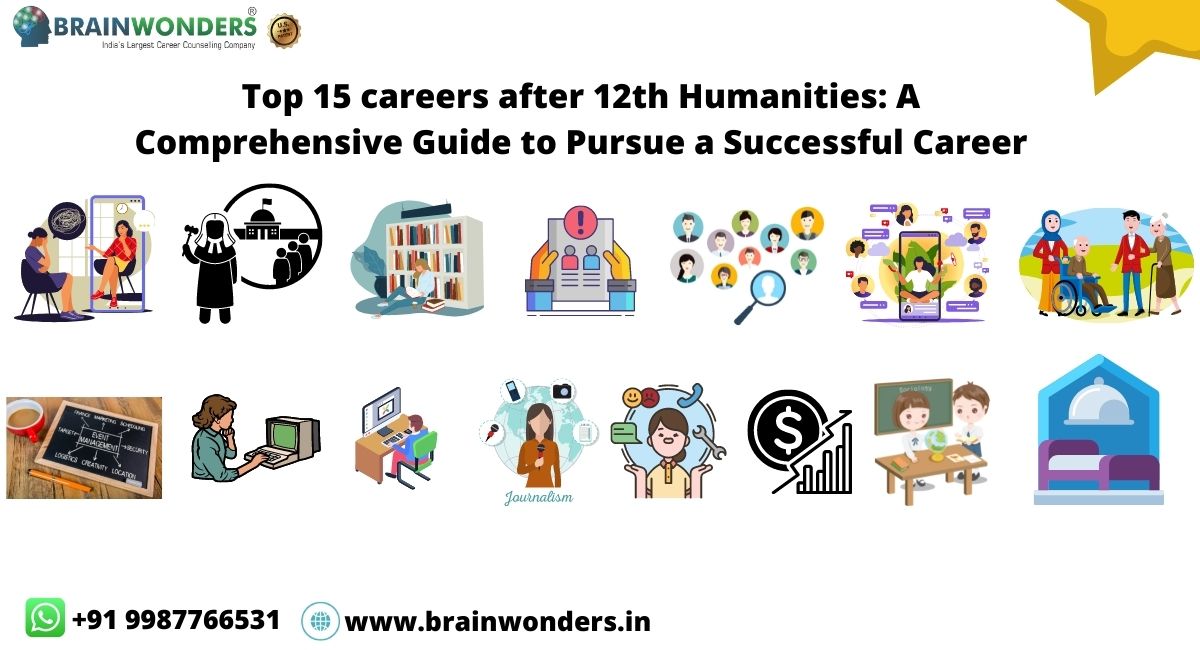

Take Brainwonders Career Test and make the right decisions for your college and course ahead
Let your unique personality, strengths, and traits guide to make the best decdision of your life!
Blog
19 January,2023 | By Brainwonders

You've probably heard a lot about science and business school grads who have done well for themselves in the professional world. But what if I told you that the humanities had produced many well-known figures? Humanities majors have created a slew of notables, including Subhash Chandra Bose, Arnab Goswami, Martin Luther King Jr., and Naom Chomsky. Unbelievable right?
Despite a relatively undervalued discipline, Humanities has one of the most profitable and engaging streams.
Humanities include a wide range of academic specialities that focus on human behaviour, thought, and culture. These include anthropology, archaeology, classics, human history, ancient and contemporary languages, law and politics, literature, philosophy, religion, performing and visual arts, etc.
Humanities is all about researching the human condition centred around socio-economic and political circumstances. It employs critical, philosophical, and analytical methods in obtaining answers, hypotheses, and premises in comprehending people. Moreover, it teaches you to think creatively and critically, to question and generate solutions. Because it covers so many different academic areas, it might be considered a comprehensive approach to education.
The subjects in this field cultivate creativity, help deepen understanding of foreign languages and cultures, foster critical thinking, create a sense of civic responsibility, and increase political awareness.
1) Creativity is encouraged through learning literary arts such as poetry, drawing and painting, theatre, music and more.
2) Humanities also allow for the exploration of different cultures, faiths and classes, increasing communication with people from various backgrounds.
3) As one studies various academic disciplines including civics and moral science, it encourages individuals to develop a sense of social justice, democracy and equality.
4) In addition, studying humanities helps hone one's critical thinking skills as one gain insight into human behaviour and how to reach logical conclusions.
5) Ultimately, pursuing a career in the humanities can bring forth immense opportunities that cannot be found elsewhere.
6) It will expand one’s knowledge and grant them greater insight into why society operates the way it does.
With the right qualifications and ambition, those who enter the field can look forward to gratifying professional experiences.
Here are ways that you can start your career in humanities
After secondary examinations, students can choose from a range of humanities subjects to explore. This includes political science, history, psychology, sociology, and philosophy. During the 11th and 12th standards, learners will gain an introduction to the fundamental concepts in each subject, enabling them to better determine which topics resonate most with their interests and passions.
Choosing a bachelor's degree in your chosen field of study is the best way to maximize your knowledge and preparation for success in your chosen career. Doing so allows you to centre your studies on that subject, gain a comprehensive understanding, and develop the expertise required for professional practice. By pursuing an in-depth program of study, you can ensure that you are well-versed in all aspects of the discipline and prepare yourself to enter the workforce with confidence.
Workshops are an excellent way for professionals to stay ahead of the curve. Through personal instruction from industry experts and thought leaders, participants gain valuable insight into the latest trends and best practices. Certificate courses and online programs complement this knowledge by introducing new skill sets that can be employed in any situation. By taking advantage of these resources, professionals can ensure they remain at the forefront of their field.
A master's degree is a valuable asset for anyone looking to specialize in their chosen field. It boosts expertise and enhances credibility, proving to employers that you are driven and knowledgeable in your field. Additionally, having a master's degree may be essential for those wishing to pursue a PhD or become a professor down the road. Investing in a master's degree is an investment in a successful future.
Gaining experience in the industry of your choice is a great way to open doors for future opportunities and advance in your career. An internship can provide you with invaluable insight into working life, as well as help you to hone your skills and make connections. Not only will it prepare you for a full-time role, but it also gives you practical experience to demonstrate during job interviews. By interning with a company that aligns with your professional goals, you are taking the first step towards securing your ideal position.
Once you have found the ideal career path for your skillset and obtained the necessary qualifications, it is time to begin applying for related positions. Crafting an effective resume that outlines your experience and qualifications is essential in order to showcase yourself as a competitive applicant. Be prepared to conduct job interviews with poise and confidence in order to effectively demonstrate your abilities. Although it may take some time to find employment in this field, maintaining a driven attitude and remaining optimistic will yield positive results. With dedication and perseverance, you will be well on your way to finding the perfect job.
These abilities and skill sets are becoming more significant and demanded in various settings.

Psychology is a broad field that covers everything from how the brain functions to how our memories are structured to how individuals behave in groups. Students of psychology may pick from various specialities after studying the fundamentals, such as Clinical Psychology, Industrial/Organizational Psychology, Forensic Psychology, Behavioral Neuroscience, Counselling Psychology, Sports Psychology, etc.
Because psychology is concerned with studying the human mind, it may be used in a wide range of sectors, including health, sports, organisations, media, forensics, etc. On the other hand, graduates of this field are most commonly employed as Counsellors, Research Analysts, Clinical Psychologists, Child Psychologists, Human Resource Specialists, Lecturers/Professors, Life Coaches, Career Counsellors, Substance Abuse Counsellors, Family Therapists, Forensic Psychologists, and other related positions.
Do you ever wonder what life was like a century ago and how people could have lived, interacted, and survived in their environment? The solutions to these questions may be found in history! Historians interpret the past using sources such as literature, artefacts, and other items from various historical periods. Historicists generate their interpretations and conclusions based on their gathered and analysed information.
If you have a degree in history, you choose to work as an archivist, lecturer, analyst, lobbyist, or any of the professions above. Historians do research in various fields, including mythology, dynasties, civilisations, politics, and culture. Historians may also serve as editors or columnists for various publishing organisations.

Lawyers are another in-demand profession in the humanities who are well-versed in the country's legal system and can provide sound advice to individuals and businesses on various legal issues. Legal cases need substantial investigation, and you must be able to construct solid arguments to support them. As a lawyer, you'll be able to assist people, businesses, non-profit organisations, and the government avoid legal issues.
A wide range of choices is available, including Litigation (courtroom battles), Corporate Counsel, and Indian Legal Services. Working in legal companies, publishing, or teaching at law schools are all options open to you. Many law students pick their specialisation/area of employment from various alternatives, such as tax laws, intellectual property rights, international human rights, civil law, criminal law, etc.
Studying a country's political history and political systems focuses on political science. On the other hand, International Interactions deal with studying international relations between nations. World peace, economic crises, poverty, jobless rates, malnutrition, and other such problems are all addressed in these two courses.
As a graduate, you may pursue a career as a lobbyist, research assistant, political analyst, or even a law degree to practise law. Diplomats, Intelligence Specialists, and members of international organisations such as the World Bank, United Nations, and the World Health Organization (WHO) may benefit from a degree in International Relations.
Employee recruiting, remuneration and well-being are the primary concerns of this position. The company's productivity may be increased by learning what drives its workers and how to make the workplace a better place to work. An MBA in HR may lead to a career in human resources management. With an HR degree, you'll be prepared for an array of intriguing jobs, each demanding a different set of talents. To top it all off, as technology advances, the need for skilled human resources professionals will not diminish. Payroll expert, Benefits administrator, Leadership coach, HR IT specialist, employee relations manager and HR analyst are just a few of the various specialities one might pursue in Human Resources.
Your management and organisational talents will be used as you organise social and commercial gatherings. Those working in this field collaborate with specialists, including suppliers, caterers, designers, and others, to plan the most important events for their clients. Many additional types of events fall under the umbrella of event management, including corporate gatherings and conclaves, sporting events and parties, reunions, festivals, etc.
You may collaborate with various event management companies, non-governmental organisations, public relations agencies, hotels/resorts, etc. Planning and coordinating multiple events, such as conferences, weddings, fundraisers, and press conferences, would be a significant part of your responsibilities.

Advertising careers include a wide range of creative and technological fields that work together to promote brand exposure, consumer retention, and engagement. Advertising focuses on developing and implementing successful advertising and campaigns and other marketing-related activities to assist businesses in achieving their goals. A career in advertising may be right for you if you want to work in a fast-paced, highly collaborative, and creative environment. A bachelor's degree in advertising or journalism is required for a job in advertising, and an MBA in marketing is also available.
Those who want to dedicate their lives to making the world a better place should choose this profession. People in need of assistance, such as those fighting for their rights, suffering from abuse, or receiving basic sanitation, are the focus of this work. Social workers may engage with a wide range of people and families to address challenges such as poverty, unemployment, and educational attainment.
As a social worker, you might work with non-governmental organisations (NGOs) that cater to various target audiences, corporations engaged in CSR (Corporate Social Responsibility), and healthcare facilities (rehabilitation centres).
The government works on several projects to raise public awareness about health safety, fundamental human rights, and social injustice.
In this sector, people who like jotting down their ideas in a journal or a laptop are encouraged to apply! Through the written word, writers express themselves intellectually and personally. Writing as a profession may take a variety of shapes. In addition to writing blog posts, you may also write content for other businesses (Content Writing). Different types of creative writing, such as novels, books, anthologies, etc., are more conventional. You may write in English, Hindi, Urdu, or any other language! You don't have to have a certain degree in writing, but you need a burning desire to write.
As a content writer, you may find employment with various businesses, websites, blogs, NGOs, and other non-profit organisations. Additionally, you may become a writer, blogger, editor, or columnist in a newspaper.
A job in design may be a good fit for you if you can communicate your thoughts and ideas to others. Pictures may be conveyed via visual representations such as photos, drawings, sketches and layouts. Graphic Design, Textiles, Interior Design, Fashion Design, and Product Design are just a few of the many sub-disciplines in design.
The kind of jobs you may get depends on your area of design. In Fashion Design, you may work with various textile manufacturing companies, shops, garment export houses, fashion brands' marketing and publicity department, etc. " Interior design, leather design, jewellery design, UI/UX design, graphic design, cartoon design, and product design are some possible career paths worth exploring.

Do you feel compelled to keep up with current happenings in your community and pass that information on to others? Here's the solution! The term "mass communication" refers to the dissemination of helpful information to a broad audience using various media, including radio, television, newspapers, journals, magazines, and social media. As a subcategory of mass communication, journalism is responsible for collecting, analysing and providing news/facts and information for the general audience.
A degree in mass communication may lead to various careers, including journalism, public relations, content creation and editing, advertising, event planning, broadcasting and production, copywriting, etc. Other options include collaborating on documentaries, films, or short clips with media production companies to cover an interview, send a social message, or simply for fun.
Being a politician is one of the most prestigious jobs since it allows you to actively participate in your nation's government and policymaking processes. Having this authority and power offers you the ability to guarantee that the country's administration runs smoothly. Whatever department you've been assigned to, your responsibilities and obligations may vary. To become a civil servant, you must first get a bachelor's degree in any discipline and then pass the UPSC test.
Your UPSC test score determines which government jobs you are eligible to apply for. The Indian Administrative Services, Indian Police Services, Indian Foreign Services, Indian Revenue Services, Indian Postal Services, and so on are just a few options available.

As a profession, economists analyse how society allocates resources, such as the land and labour needed to generate different commodities and services. Research, data collection, analysis and forecasting on a broad range of problems such as interest rates, energy prices, inflation, currency exchange rates, business cycles and taxes are all part of this effort.
After finishing your degree, you may work as a Risk Advisory Associate, Analyst, Research Assistant, Policy Maker, etc., at banking firms, research firms, financial consultancies, government ministries, or insurance and accounting firms.
In the social sciences, sociology is the study of society itself. Analysing and comprehending the social lives of individuals, organisations, and institutions are all part of the process. Researchers in the field of sociology assist in examining and generating conclusions on a wide range of issues, including race and gender identity, religious beliefs, family strife, criminality and the law, extreme poverty, population growth and migration, war and peace, and many more.
There are various career options for sociologists, including working with children as a Guidance Counselor to help them resolve family disputes or working for the government as a Policy Analyst to help shape public policy. The HR department of commercial and governmental enterprises might hire you as a consultant. Several professions are well-suited to sociology degrees, including market research and public relations.
Find Your Top Career From The Best Colleges, Courses, and Industries now - TheCareerHub
I can't begin to express how wonderful it is to stay at these hotels: Taj, The Lalit, Le Meridien, The Leela. But have you ever considered how much effort it takes to make them the finest in their respective fields? To succeed in the hotel management field, you must be able to handle everything from the front desk to the dining service to the cleaning. In addition, you'll have the opportunity to engage in hotel operations, hotel marketing strategy, hospitality technology, and financial analysis.
You may work in hotels, restaurants, cruise ships, trains, resorts, airlines, and more in the hospitality industry. Management trainees in this profession begin their careers in several departments, such as Front Office Operations, Food and Beverage Production, Meeting and Event Operations Management, Restaurant Operations, etc. As your career progresses in this area, you may be given supervisory responsibilities.
Despite common misconceptions that a humanities degree means nothing in the job market and that the humanities aren't as valuable as the sciences, we're assured that there are several professional paths open to those who complete their studies in the humanities.
There are many options available to you, regardless of what you studied or what your career goals are. Humanities bachelor's degree holders may have had fewer work alternatives in the past, but as we showed in this article, that is no longer the case.
However, since this is one of the most critical choices of your life, you should not rush into it. As a result, it is essential to make an informed decision, whether consulting with friends and family or a career counsellor.
As part of our services at Brainwonders, we also provide one-on-one Career Counselling to ensure that children can choose the correct route for their future.
Recommended Read:
Take Brainwonders Career Test and make the right decisions for your college and course ahead